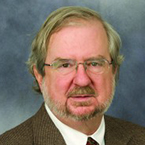
A globally recognized immunologist, Dr. Allison studies the molecular mechanisms of T-cell receptor activation and the downstream signal transduction events capable of affecting immune function. This research focus led him to discover CTLA-4, an immune system inhibitory checkpoint molecule expressed by T cells. His lab has since developed an antibody against CTLA-4 that inhibits tumor growth in mice, research which resulted in the development of the monoclonal antibody, ipilimumab, the first drug able to improve survival rates of metastatic melanoma patients.
Ipilimumab received FDA approval as a treatment for metastatic melanoma in 2011 and functions by specifically blocking CTLA-4, subsequently allowing the immune system to recognize and attack cancerous cells. Dr. Allison calls this mechanism of action, “immune checkpoint blockade,” and believes that by combining targeted therapies with checkpoint blockade inducers, one can turn cancer ‘s genomic instability, which it uses to build resistance to drugs, against it. He is now applying this approach to a variety of cancers through his leadership of the Stand Up to Cancer Dream Team, “Immune Checkpoint Blockade and Adoptive Cell Transfer in Cancer Therapy”.
Aside from his work involving CTLA-4, Dr. Allison is also credited with discovering the T-cell antigen receptor as well as the co-stimulatory molecule, CD28. These major discoveries have cemented Dr. Allison’s status as a leader in the fields of immunology and immunotherapeutics, active areas of research that continue to receive increased interest throughout the cancer research community.
Career Highlights
2019 Luminary Award, Texas Healthcare & Bioscience Institute
2018 UCL Prize Lecture in Clinical Science
2018 Albany Medical Center Prize in Medicine and Biomedical Research
2018 BBVA Foundation Frontiers of Knowledge Laureate
2018 Honorary Member, President’s Council, The New York Academy of Sciences
2018 King Faisal International Prize
2018 Mike Hogg Award and Lecture, The University of Texas MD Anderson Cancer Center
2018 The Dr. Paul Janssen Award for Biomedical Research, Johnson & Johnson
2018 Health Hero, Lifetime Achievement Award, WebMD
2018 Nobel Prize in Physiology or Medicine
2018 Jessie Stevenson Kovalenko Medal, National Academy of Sciences
2017 Balzan Prize for Immunological Approaches in Cancer Therapy
2017 Sjöberg Prize
2016 Fudan-Zhongzhi Science Award
2015 Lasker-DeBakey Clinical Medical Research Award
2015 ASCO Science of Oncology Award
2015 Paul Ehrlich and Ludwig Darmstaedter Prize
2015 Pezcoller Foundation-AACR International Award for Cancer Research
2014 SU2C Phillip A. Sharp Innovation in Collaboration Award
2014 OncLive Giants of Cancer Care Award for Scientific Advances
2014 Breakthrough Prize in Life Sciences
2014 AACR G.H.A. Clowes Memorial Award
2013 AACR-CRI Lloyd J. Old Award
2011 Lifetime Achievement Award, American Association of Immunologists
2011 Jacob Heskel Gabbay Award in Biotechnology and Medicine, Brandeis University
2010 Richard V. Smalley, MD, Memorial Award, Society for Immunotherapy of Cancer
2008 AAI-Dana Award in Human Immunology Research
2007 Elected Member, Institute of Medicine
2006 Elected Fellow, American Association for the Advancement of Science
2005 William B. Coley Award for Distinguished Research in Basic and Tumor Immunology, Cancer Research Institute
2001 Centeon Award for Innovative Breakthroughs in Immunology, Aventis Behring GmbH
1998 Founding Member, Academy of Cancer Immunology
1997 Elected Member, National Academy of Sciences, Washington, D.C.
1997 Elected Fellow, American Academy of Microbiology
1973 PhD, University of Texas at Austin
[Institutional affiliations listed for Fellows reflect those held at the time of their induction into the AACR Academy.]